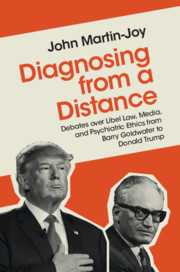 Diagnosing from a Distance
Diagnosing from a Distance Book contents
- Diagnosing from a Distance
- Diagnosing from a Distance
- Copyright page
- Dedication
- Contents
- About the Author
- Acknowledgments
- Abbreviations
- Introduction An Ethical Dilemma
- Chapter 1 Psychoanalysis, Media, and Politics from the Rise of Hitler to the 1950s
- Part I Diagnosis from a Distance and Libel Law in the 1960s: Goldwater v. Ginzburg
- Part II Professionalization and the Rise of the Goldwater Rule
- Chapter 5 “To Protect Public Figures”
- Chapter 6 The CIA and the White House
- Chapter 7 Furor
- Conclusion On History, Ethics, and Pluralism
- Appendix The Goldwater Rule in 1973 and Today
- Photographs of Key People and Events
- Notes
- Works Cited
- Index
Conclusion - On History, Ethics, and Pluralism
from Part II - Professionalization and the Rise of the Goldwater Rule
Published online by Cambridge University Press: 29 February 2020
- Diagnosing from a Distance
- Diagnosing from a Distance
- Copyright page
- Dedication
- Contents
- About the Author
- Acknowledgments
- Abbreviations
- Introduction An Ethical Dilemma
- Chapter 1 Psychoanalysis, Media, and Politics from the Rise of Hitler to the 1950s
- Part I Diagnosis from a Distance and Libel Law in the 1960s: Goldwater v. Ginzburg
- Part II Professionalization and the Rise of the Goldwater Rule
- Chapter 5 “To Protect Public Figures”
- Chapter 6 The CIA and the White House
- Chapter 7 Furor
- Conclusion On History, Ethics, and Pluralism
- Appendix The Goldwater Rule in 1973 and Today
- Photographs of Key People and Events
- Notes
- Works Cited
- Index
Summary
This chapter reviews the material presented in this book, including the history of novel legal doctrines; the use of libel law for political purposes; the interrelationship between politicians, media, and political followers; and the recurring debates over the ethics of comment from a distance. Goldwater was so far ahead of his time in understanding the political value of lawsuits that he anticipated the conservative legal movement of the 1980s. I then propose an alternative approach to the Goldwater Rule, drawing on the work of philosophers James Madison, John Rawls, Jacques Mauritain, and Martha Nussbaum to argue for a more liberal and tolerant guideline for psychiatric comment on public figures. The APsaA, in response to the Fact episode of 1964, adopted such a guideline under President Heinz Kohut. The result was a respectful and ethically coherent stance that has stood the test of time. Instead of banning comment outright as the APA’s Goldwater Rule does – a form of coercive paternalism in the sense described by philosopher Sarah Conley and others – I argue that the psychiatric community should respect the conscience of the individual psychiatrist acting in good faith.
Keywords
- Type
- Chapter
- Information
- Diagnosing from a DistanceDebates over Libel Law, Media, and Psychiatric Ethics from Barry Goldwater to Donald Trump, pp. 224 - 248Publisher: Cambridge University PressPrint publication year: 2020


